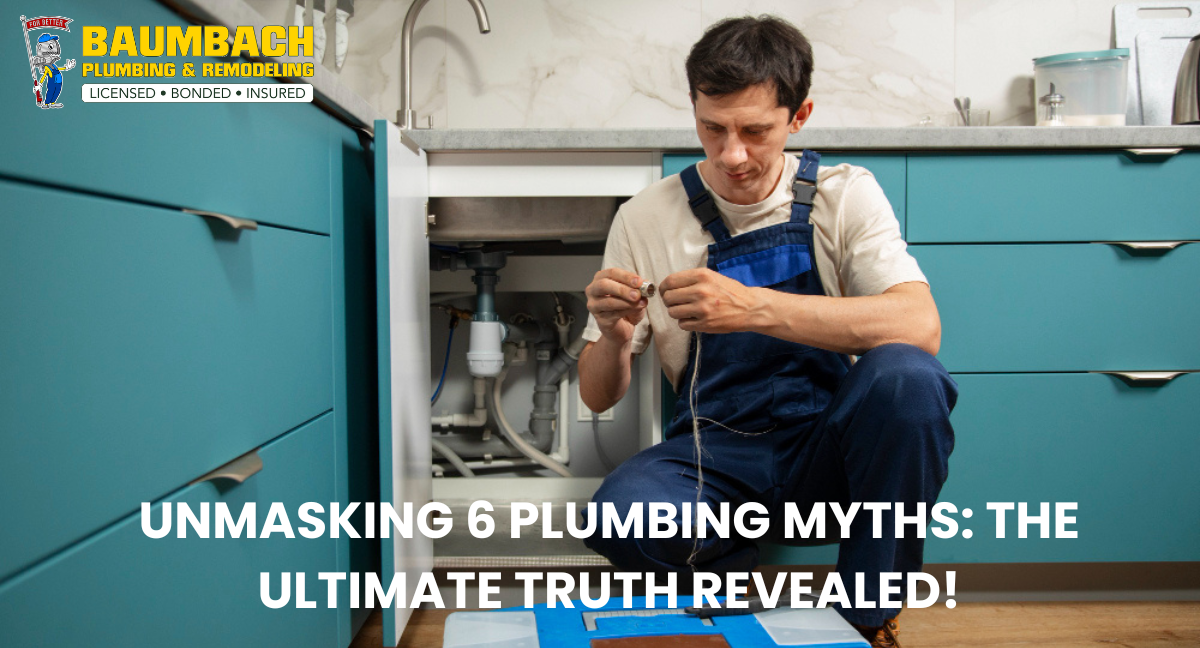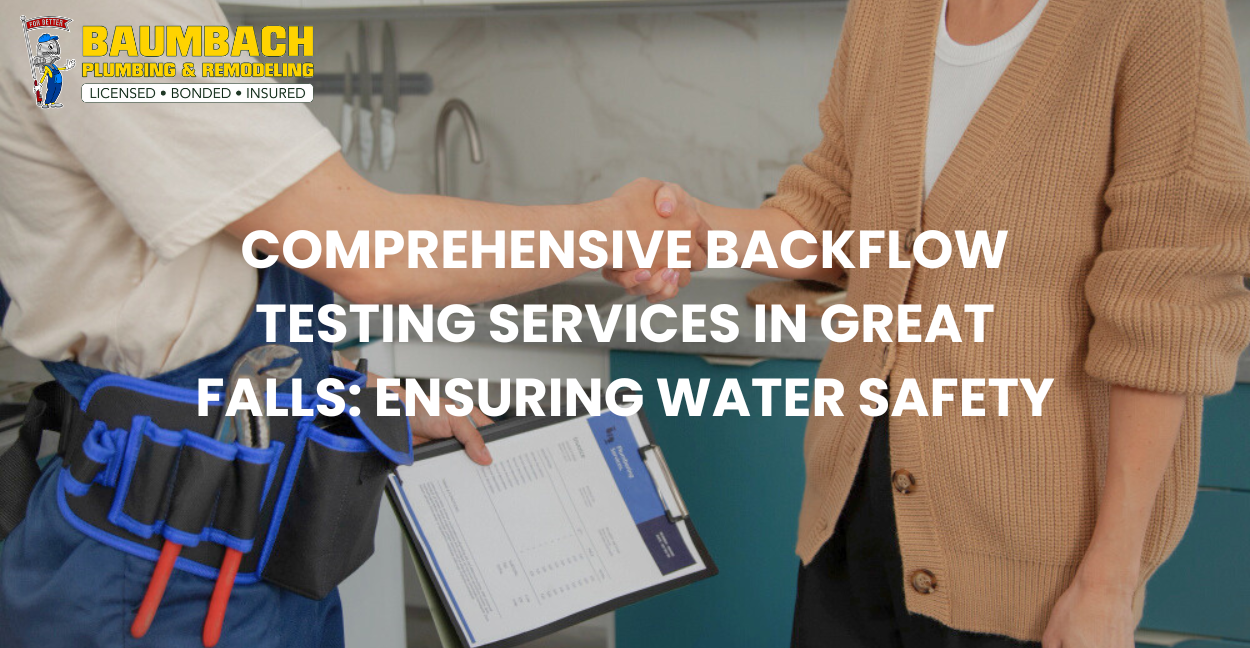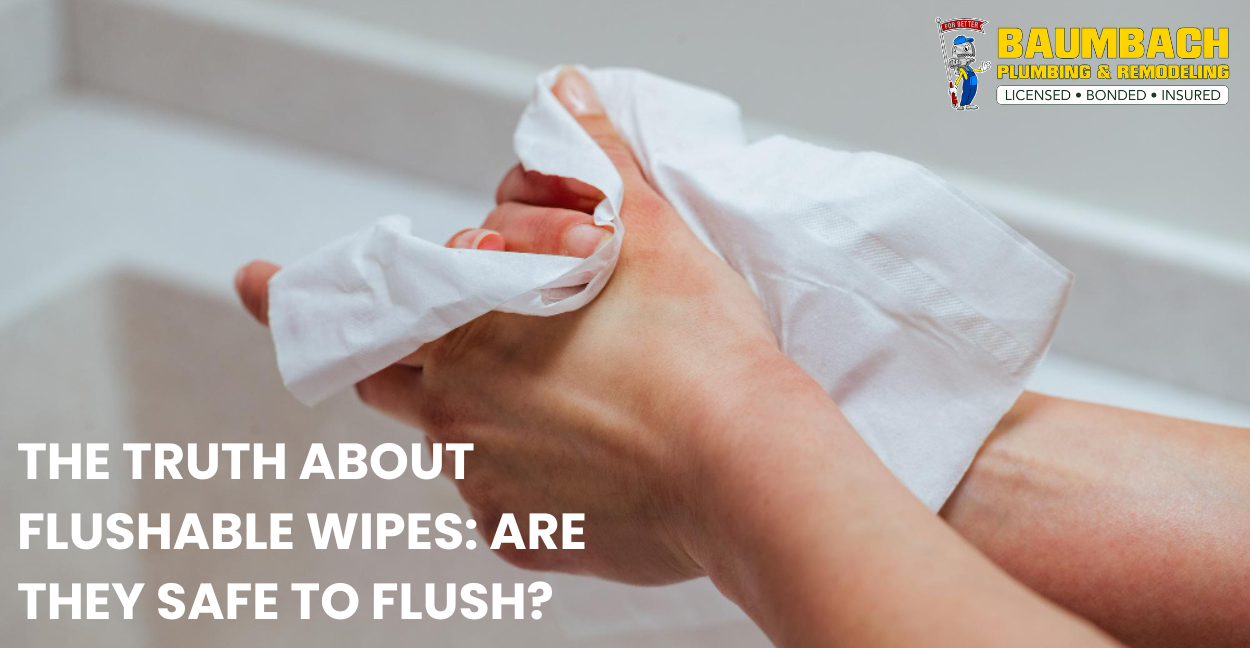Plumbing is an essential aspect of our homes, ensuring that water flows seamlessly and waste is disposed of efficiently. However, there are several plumbing myths circulating about plumbing that can mislead homeowners and even lead to unnecessary expenses. In this article, we’ll discuss some of the most prevalent plumbing myths, providing you with accurate information to better understand and care for your plumbing system.
Unmasking 6 Plumbing Myths
Myth 1: Lemons Keep Your Garbage Disposal Clean
One popular myth suggests that tossing lemon peels down your garbage disposal will keep it fresh and clean. While the citrusy aroma is undoubtedly pleasant, the acidic nature of lemons can harm the metal components of the disposal. Instead, consider using ice cubes to sharpen the blades and a mixture of baking soda and vinegar to eliminate odors and break down grease.
Myth 2: You Can Use Your Toilet as a Trash Can
Many homeowners believe that toilets can handle anything, from facial tissues to cotton swabs. However, toilets are designed specifically for human waste and toilet paper. Flushing items like wipes, cotton balls, and paper towels can lead to clogs and sewer backups. Dispose of these items in the trash to prevent plumbing issues.
Myth 3: A Plunger Can Fix Any Clog
While a plunger is a handy tool for minor clogs, it won’t solve every blockage issue. Persistent clogs may require professional intervention. Additionally, using excessive force with a plunger can damage the pipes. Knowing when to call a plumber is crucial to preventing further damage and costly repairs.
Myth 4: All Plumbers Provide the Same Service
Not all plumbers are created equal. Some specialize in residential plumbing, while others focus on commercial or industrial settings. When hiring a plumber, ensure they have expertise in the specific area you need assistance with. It’s also essential to check their credentials and reviews to guarantee quality service.
If you are looking for a plumber with a great reputation for high-quality work and friendly customer service, get in touch with Baumbach Plumbing & Remodeling.
Myth 5: Water Heaters Don’t Require Maintenance
Contrary to popular belief, water heaters do require regular maintenance to function efficiently and prolong their lifespan. Flushing the tank annually removes sediment buildup, ensuring your water heater operates at its best. Neglecting maintenance can lead to reduced efficiency, higher energy bills, and even premature failure.
Myth 6: In-tank Cleaners Are the Best Way to Keep Your Toilet Bowl Clean
While in-tank cleaners may seem convenient, they often contain harsh chemicals that can damage the toilet’s internal components over time. Instead, opt for regular cleaning with a mild toilet bowl cleaner or a mixture of baking soda and vinegar to maintain a clean and odor-free toilet.
By dispelling these common plumbing myths, homeowners can better care for their plumbing systems and avoid unnecessary headaches and expenses. Understanding the facts behind these misconceptions empowers individuals to make informed decisions about their plumbing maintenance and repairs.
What You Should Never Flush: A Simple Guide to Protecting Your Plumbing
Wet Wipes and Baby Wipes: Not Toilet-Friendly
One common mistake is flushing wet wipes, including those labeled as “flushable.” Despite the label, these wipes don’t break down as easily as toilet paper and can lead to stubborn clogs. Dispose of wet wipes in the trash to avoid potential plumbing headaches.
Paper Towels and Tissues: Bin Them Instead
While toilet paper is designed to break down in water, paper towels and tissues are not. Flushing these thicker materials can quickly lead to blockages. Remember, the toilet is only meant for human waste and toilet paper.
Feminine Hygiene Products: Bin It, Don’t Flush It
Feminine hygiene products, such as tampons and sanitary pads, should never be flushed. These items can expand and cause blockages in the pipes. Dispose of them in a waste bin to prevent plumbing issues.
Dental Floss: A Silent Menace
Dental floss may seem harmless, but it’s non-biodegradable and can wrap around other debris in the pipes, creating blockages. Throw dental floss in the trash to protect your plumbing.
Kitchen Plumbing Myths: Unraveling the Realities You Need to Know
There are several myths circulating about kitchen plumbing that can lead to confusion and potential issues. Let’s dive into common kitchen plumbing myths, providing you with the truth to help you navigate this essential space with confidence.
Myth 1: Grease Can Be Safely Washed Down the Kitchen Sink
One prevalent misconception is that pouring cooking grease down the kitchen sink is harmless. In reality, grease can solidify in the pipes over time, causing stubborn clogs. It’s advisable to let grease cool and solidify in a container before disposing of it in the trash to prevent plumbing issues.
Myth 2: Running Hot Water While Grinding Food in the Garbage Disposal Keeps it Clean
While hot water is beneficial for breaking down some types of food waste, relying on it solely for garbage disposal cleaning is a myth. Grinding ice cubes and citrus peels can help maintain a fresh-smelling disposal, and the occasional use of baking soda and vinegar can keep it clean. Hot water alone won’t prevent odors and buildup.
Myth 3: All Fats and Oils Can Go Down the Garbage Disposal
Not all fats and oils are created equal, and not all of them should go down the garbage disposal. While some liquid oils may seem harmless, solid fats like lard and butter can lead to clogs. Dispose of solid fats in the trash to avoid potential plumbing headaches.
Myth 4: Lemon Peels Are Ideal for Cleaning and Freshening the Garbage Disposal
While the citrusy aroma of lemon peels is pleasant, they can contribute to the wear and tear of garbage disposal blades. Instead, use a mixture of ice cubes and salt to sharpen the blades and follow up with baking soda and vinegar for a fresh and clean disposal.
Myth 5: Overusing the Garbage Disposal is Harmless
Some believe that garbage disposals can handle anything. However, overusing the disposal and filling it with hard or fibrous materials can lead to damage and clogs. Use it responsibly, and be cautious about what you put down the drain to prevent potential issues.
Remember to be mindful of what goes down the drain, practice regular maintenance, and consider professional help when needed. A little knowledge goes a long way in ensuring that your kitchen remains a functional and enjoyable space for your culinary adventures.
Can Hot Water Really Clear Grease Clogs or Is It Just a Plumbing Myth?
When it comes to dealing with a clogged drain, the internet is rife with do-it-yourself remedies, and one of the most popular suggestions is pouring hot water down the drain to melt away stubborn grease buildups. But is this method a tried-and-true solution, or is it merely a plumbing myth? Let’s dive into the science behind it and separate fact from fiction.
Understanding the Grease Conundrum
Firstly, it’s crucial to comprehend why grease becomes a menace in our plumbing systems. Over time, grease and fats from cooking can solidify in pipes, forming a stubborn obstruction that restricts the flow of water. Traditional wisdom suggests that hot water can melt this congealed grease, allowing it to flow down the drain smoothly.
The Science behind Hot Water and Grease
Hot water does have some ability to break down grease. When hot water is poured into a clogged drain, it raises the temperature of the grease, causing it to become more viscous and easier to wash away. However, the effectiveness of this method depends on various factors, including the severity of the clog, the type of pipes, and the temperature of the water.
Temperature Matters
The temperature of the hot water plays a crucial role in determining its effectiveness. Water needs to be hot enough to melt the grease but not so hot that it causes damage to the pipes. Extremely hot water may soften PVC pipes, potentially leading to warping or distortion over time. Therefore, it’s essential to find a balance – using very hot but not scalding water is key.
When Hot Water Falls Short
While hot water can be effective for minor grease buildups, it may not be sufficient for more significant clogs or when grease has solidified deep within the pipes. In such cases, a simple pour of hot water might provide temporary relief but won’t address the root cause of the problem.
In conclusion, the idea of pouring hot water down the drain to clear grease clogs is not entirely a myth. It can work to some extent, especially for minor clogs. However, it’s not a one-size-fits-all solution, and its effectiveness depends on various factors. For more severe clogs or long-term prevention, consulting with a professional plumber is the wisest course of action.
We, at Baumbach Plumbing, take pride in being the premier plumbing and bathroom remodeling services company in Northern Virginia. With a commitment to excellence and years of expertise, we stand ready to address all your plumbing needs and bring your bathroom dreams to life. Our skilled professionals are dedicated to delivering top-notch solutions, ensuring your satisfaction every step of the way.






